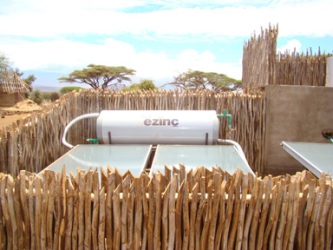Kenya: Regulation Increases Solar Water Heater Uptake
April 17, 2012
Solar Water Heater in Kenya
 Although Kenya’s Energy (Solar Water Heating) Regulations 2010 have not yet come into force officially, they have already had an effect on the market. The draft of the regulation says that, “within a period of five years from the date of when these regulations come into force, all owners of existing buildings that require more than 100 litres of hot water per day shall install and use a solar water heater”. “This requirement has retroactive effect,” confirms Bernard Osawa, former Director Renewable Energy at the Energy Regulatory Commission (ERC). “It is cheaper for a house builder to include a solar water heater during the construction of the building today than it is to retrofit the system in five years.” The regulation applies mainly to urban areas, because rural households do not use hot water at all.
Although Kenya’s Energy (Solar Water Heating) Regulations 2010 have not yet come into force officially, they have already had an effect on the market. The draft of the regulation says that, “within a period of five years from the date of when these regulations come into force, all owners of existing buildings that require more than 100 litres of hot water per day shall install and use a solar water heater”. “This requirement has retroactive effect,” confirms Bernard Osawa, former Director Renewable Energy at the Energy Regulatory Commission (ERC). “It is cheaper for a house builder to include a solar water heater during the construction of the building today than it is to retrofit the system in five years.” The regulation applies mainly to urban areas, because rural households do not use hot water at all.
Photo: Center for Alternative Technologies Kenya Ltd
To heat water, the residential sector in Kenya consumes about 820 GWh of electricity annually, Osawa confirms. “This is putting a strain on the power infrastructure, especially in the morning and the evening,” he says. The use of solar water heating systems could reduce the demand by domestic, institutional and commercial users during peak times.
The regulation requires the solar system to cover at least 60 % of the building’s annual hot water demand (see the attached PDF). It applies to all new buildings – residential and commercial – that have a hot water capacity of more than 100 litres per day and also to existing buildings during a transition time of 5 years. Unfortunately, there have been some delays in making the regulation legally binding. “Our final draft from the end of 2010 was lying around at the state council for over a year,” Osawa says. The government was too busy with the country’s new constitution and the solar obligation was not considered an urgent issue. In February 2012, something finally happened: According to Osawa, the regulation was passed on to the energy ministry. The former Director expects the minister to sign the law in the short term, so that the regulation could come into force in the first half of 2012.
The Energy (Solar Water Heater) Regulations 2010 stipulate that electric power distributors or suppliers,“ shall not provide electricity supply to premises at which an SWH has not been installed in accordance with these Regulations”. The regulations also set a penalty for persons who do not follow the provisions set forth in the document: Any break of the law can result in a payment of up to Kenyan Shillings (KES) 2 million and/or two years in prison. Exempt from the solar obligation are houses with technical limitations, such as high-rise buildings, premises that are supplied by co-generation, or buildings that cover hot water demand by renewable or green electricity.
Furthermore, the regulatory framework says that the solar components need to comply with Kenyan technical standards and that installers need to be licenced by the ERC. The draft law also requires the commission to maintain a register of all eligible solar water heater technicians and contractors.
The Energy (Solar Water Heater) Regulations 2010 are a follow-up to the 2006 Energy Law, in which it says that all types of renewable energies should be promoted and that the ministries can enact respective regulations. Bernard Osawa has been leading the drafting process of the SWH Regulations for three years now. “In 2009, we first set up some guidelines and discussed them with the stakeholders in the industry and the administration,” says Osawa. Afterwards, a technical team wrote down the regulation and it was discussed with the stakeholders a second time. The attached draft is the new regulation that was finalised at the end of 2010 and handed over to the state council where it got stuck.
Osawa, who quit his job as Director Renewable Energy at ERC, notes that Kenya’s solar water heater market has so far shown only little growth because of capacity and financial barriers. He emphasises that the current costs of a typical 100 litre solar hot water system amount to USD 1,500, a price that many households cannot pay. “There is a low awareness of the technology and its financial benefits. Also, the SWH market lacks greatly in trained contractors and technicians to install and maintain the systems.”
More information:
http://www.erc.go.ke


